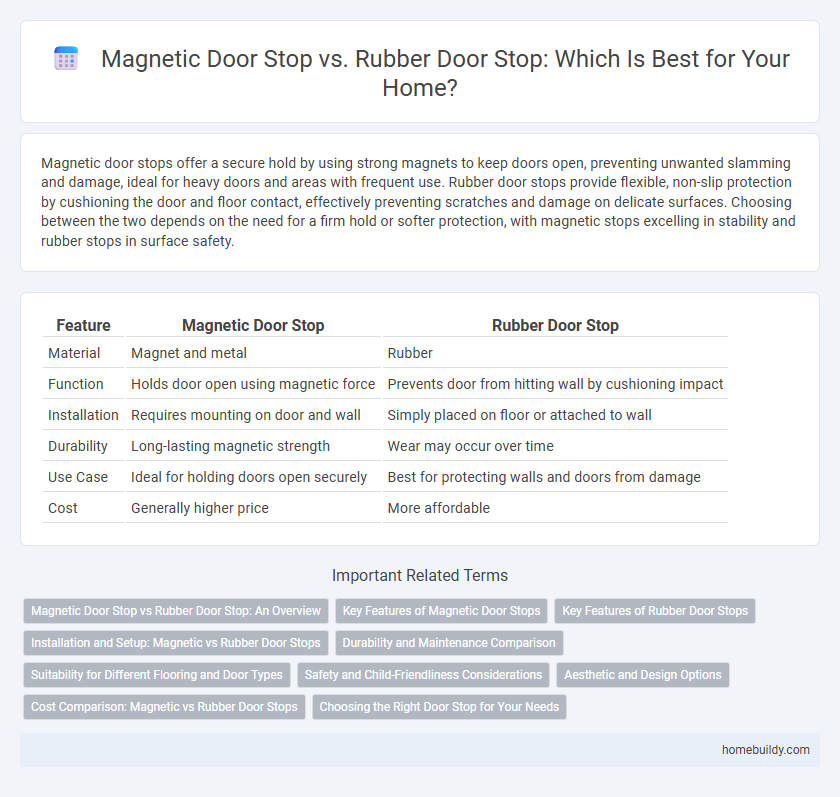Magnetic door stops offer a secure hold by using strong magnets to keep doors open, preventing unwanted slamming and damage, ideal for heavy doors and areas with frequent use. Rubber door stops provide flexible, non-slip protection by cushioning the door and floor contact, effectively preventing scratches and damage on delicate surfaces. Choosing between the two depends on the need for a firm hold or softer protection, with magnetic stops excelling in stability and rubber stops in surface safety.
Table of Comparison
| Feature | Magnetic Door Stop | Rubber Door Stop |
|---|---|---|
| Material | Magnet and metal | Rubber |
| Function | Holds door open using magnetic force | Prevents door from hitting wall by cushioning impact |
| Installation | Requires mounting on door and wall | Simply placed on floor or attached to wall |
| Durability | Long-lasting magnetic strength | Wear may occur over time |
| Use Case | Ideal for holding doors open securely | Best for protecting walls and doors from damage |
| Cost | Generally higher price | More affordable |
Magnetic Door Stop vs Rubber Door Stop: An Overview
Magnetic door stops provide secure hold and prevent door slamming by using strong magnets to keep doors open, while rubber door stops rely on friction and cushioning to block door movement and protect walls. Magnetic door stops are ideal for environments requiring hands-free operation and consistent positioning, whereas rubber door stops offer simplicity and effectiveness for temporary stops without installation. Choosing between magnetic and rubber door stops depends on the need for durability, ease of use, and the type of surface interaction desired.
Key Features of Magnetic Door Stops
Magnetic door stops feature powerful magnets that securely hold doors open, preventing unwanted slamming and damage. They offer durability with metal construction and provide hands-free operation by automatically catching the door when it reaches the stop. Unlike rubber door stops, magnetic versions combine functionality with a sleek design and enhanced stability for various door types.
Key Features of Rubber Door Stops
Rubber door stops offer superior grip and flexibility, preventing doors from slamming shut while protecting floors from scratches. Unlike magnetic door stops, they do not rely on metal components, reducing wear and the risk of rust or damage. Their shock-absorbing properties make rubber door stops ideal for homes with children or pets, providing quiet and durable door stability.
Installation and Setup: Magnetic vs Rubber Door Stops
Magnetic door stops require precise alignment during installation to ensure the magnet securely holds the door in place, often involving mounting a metal plate on the door and a magnetic base on the wall or floor. Rubber door stops feature a simpler setup, typically requiring only a single screw to fix the stop on the floor or wall, making them easier and quicker to install. The magnetic option demands more detailed positioning for optimal function, while rubber stops offer straightforward placement with minimal adjustment.
Durability and Maintenance Comparison
Magnetic door stops offer superior durability due to their metal construction and resistance to wear, ensuring long-lasting performance without frequent replacements. Rubber door stops, while effective in preventing door damage, tend to degrade over time from constant impact and exposure to environmental elements. Maintenance for magnetic door stops typically involves occasional cleaning to prevent magnet corrosion, whereas rubber stops require periodic inspection for cracks and deformation.
Suitability for Different Flooring and Door Types
Magnetic door stops are ideal for hardwood, tile, and laminate floors where a secure hold is needed without floor damage, and they work best with doors made of metal or wood that can support a magnetic catch. Rubber door stops provide excellent grip and cushioning on carpeted or uneven floors, making them suitable for wooden or hollow-core doors where gentle stopping is preferred. Choosing between magnetic and rubber door stops depends on the flooring material and door weight, ensuring durability and effectiveness in preventing door damage.
Safety and Child-Friendliness Considerations
Magnetic door stops provide a secure hold that prevents doors from slamming, reducing the risk of finger injuries, making them safer for homes with children. Rubber door stops offer cushioning effects that absorb impact, minimizing noise and protecting children's hands from pinching, enhancing child-friendliness. Choosing between magnetic and rubber door stops depends on the specific safety needs and the level of child-proofing required in a living space.
Aesthetic and Design Options
Magnetic door stops offer sleek, modern aesthetics with minimalist designs that blend seamlessly into contemporary interiors, often available in finishes like brushed nickel or matte black. Rubber door stops prioritize functionality with varied shapes and vibrant colors, providing a more casual, utilitarian look suitable for informal spaces. Choosing between the two depends on whether design integration or visual versatility is the primary concern in your space.
Cost Comparison: Magnetic vs Rubber Door Stops
Magnetic door stops generally have a higher upfront cost compared to rubber door stops due to their metal construction and magnetic components, typically ranging from $15 to $30 per unit versus $5 to $10 for rubber versions. Rubber door stops offer a budget-friendly option with low maintenance and no risk of corrosion, making them ideal for cost-conscious consumers. While magnetic door stops provide stronger hold and durability, the initial investment is significantly greater, impacting overall project budgeting.
Choosing the Right Door Stop for Your Needs
Magnetic door stops provide secure holding power by using strong magnets to keep doors firmly open, making them ideal for heavy or frequently used doors. Rubber door stops are designed to prevent door damage and minimize noise by absorbing impact, perfect for lighter doors and areas where quiet operation is essential. Selecting the right door stop depends on the door's weight, frequency of use, and environment, ensuring both durability and functionality for your specific needs.
Magnetic Door Stop vs Rubber Door Stop Infographic

 homebuildy.com
homebuildy.com